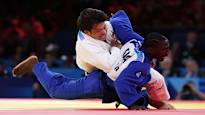Paris Olympics on channels 26.7.–11.8. Go to the competition website here. You can find the entire program of the games here.
Japanese judo fans have been shocked by the judo judging at the Paris Olympics. Judo fans have even been angry at the fact that the original roots of the Japanese martial art have been forgotten, i.e. the lack of respect for the opponents.
Criticism arose from the mixed team Olympic final. The Japanese and many other sports people thought that the referees favored the host country in the epic final match between France and Japan.
France was in a class of its own for a long time in the mixed team competition, overwhelmingly beating Israel, Korea and Italy in the semi-finals.
It wasn’t until the Olympic final that Japan brought the host country to the brink of a gap after taking a 3–1 lead in six matches. At that point, Japan had two chances for Olympic gold, while four wins guarantee victory.
Rated as the best ludoka in the world at the moment Hifumi Abe however, he was unable to beat the competitor higher up in the series, who brought Olympic silver to France in the 73 kg category Joan-Benjamin Gabaaand not after that Miku Takaichi neither Clarisse Agbegnenouta.
Finally, in the match of fate, the greatest of all time Teddy Riner beat out Tatsuro Saito for the second time in the final.
Japanese athletes and the country’s press almost never publicly criticize the injustice they may have experienced.
On the other hand, on social media, the country’s judo people did not spare their words when, in their opinion, Hifumi Abe and Japan were “robbed” of the Olympic gold by unfair, scandalous judging. Gaba was described as more of a wrestler than a judoka.
Urheilu’s judo expert Tommi Valtonen understand Japanese bites.
– Gaba fights on the same line as you can pull in judo today. Some of the contestants know how to take advantage of it. It’s not great judo, but you can take a match with that breaking style and it takes away the opportunity from beautiful vertical judo, the expert describes.
In connection with the tweet of the International Judo Federation, people – mainly Japanese – vented their anger and bad feeling.
In the middle of the colorful gold celebrations in France, Japan’s number one judo star, Abe, who won the last two Olympic gold medals in the under-66-kilogram category with superior performances, broke down in tears after losing the country’s gold medal.
– Especially the nearly nine-minute match between Gaba and Abe raised a few questions for me, Valtonen says.
Valtonen says bluntly that if the match in question had not been the deciding match of the team competition at that point, there would probably have been more warnings, and Abe would have won.
– At the beginning of extra time, probably three minutes went by without Gaba making a single real attack in the situation of two warnings. The line changed at that point, noted the expert.
Valtonen adds that, in his opinion, there were no special, big refereeing mistakes on the day of the team competition.
Before the Olympic final, South Korea also beat Germany in the bronze medal match in an extra tie-breaker with a draw, winning 4–3. Baul An beat Germany in it Igor Wandtken with warnings, overtime.
Valtonen admits that the same line was no longer followed in the collaboration between Abe and Gaba.
– On the other hand, Japan’s Tatsuro to Saito neither was a third warning given in overtime in the over-90-kilogram deciding match Teddy Riner against. We were waiting for a throwing point, which then came. Of course, in the match between Abe and Gaba, the “stinging” of the warnings was clearer.
In addition to Abe’s fate, Japanese judo viewers were troubled by the dubious lottery method that took place on the giant screen, which brought the hosts just “appropriately” to the decisive rematch with Riner. The wildest critics even talked about a conspiracy theory.
– Yes, it is probably unlikely that the men’s plus 90 kg series was drawn there, when it had already been drawn once before. But there’s no way to say that with certainty, Valtonen thinks.
In addition, the sport’s image was damaged in Japan by the lack of appreciation of the opponents – mainly the judokas of the French team. The etiquette of the sport also includes always respecting and considering the opponents in moments of victory.
In Japan, they are not used to the insane, loud cheering from the French audience. Nor does it belong to the son of a samurai family, who developed the sport Jigoro Kano to orthodox judo.
– Well, in a certain way there is a small grain of truth in this too, but of course they mirror it in their own culture. In Japan they don’t do it, but the French, on the other hand, celebrate quite wildly. It’s a sporting event, and the audience can’t be asked to be quiet – especially when not all spectators are judokas, the expert sees.
For Japan, the Olympic judo tournament was a disappointment overall medal statistics despite the first place. In Tokyo, the country won another nine Olympic golds, in Paris only three more.
